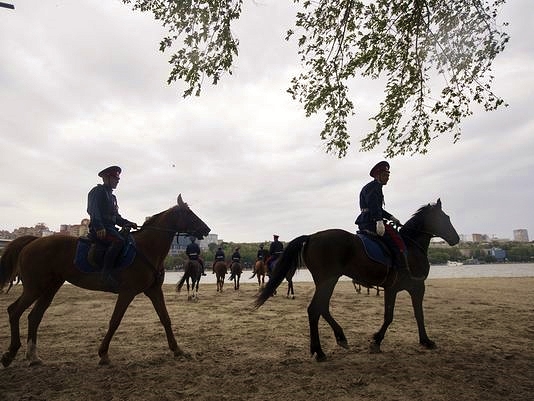
Cossack–North Caucasian Cooperation Threatens Moscow’s Divide-and-Rule Strategy
Publication: Eurasia Daily Monitor Volume: 15 Issue: 136
By:

Since the Russian state moved into non-Russian areas, it has generally been able to play Cossack units against the local non-Russians in order to strengthen its own position. It did that in the Middle Volga, in Siberia and the Russian Far East, as well as in Central Asia. But nowhere has that policy remained more often employed than in the North Caucasus, where Moscow has worked hard to keep the Cossacks and the indigenous non-Russian populations at loggerheads—even in Soviet times, when the state viewed the Cossacks as its enemies. Now, however, the Cossacks in that region are increasingly entering into alliances with non-Russian groups there, threatening Moscow’s ability to employ its traditional divide-and-rule strategy. This is particularly so because the North Caucasian groups have announced they will have nothing to do with the Kremlin-created “registered” Cossacks but only with genuine Cossack organizations, a position the latter are certain to welcome (Russian7.ru, May 3; Facebook.com/avraham.shmulevich, Windowoneurasia2.blogspot.com, May 8).
This past August, in a development little noted at the time, Valery Shveydel, the leader of the All-Cossack Social Center’s Terek district, met in Stavropol Krai with Ruslan Kutayev, the president of the Association of the Peoples of the Caucasus (APC). Other Cossack and North Caucasian activists took part in the session by telephone. The purpose of the meeting was to discuss cooperation and establish “friendly or even allied relations” between the two organizations; that goal, both sides say, was achieved as developments in the past few weeks have demonstrated (Voccentr.info, August 24).
The Association of Peoples of the Caucasus is the new name of the former Confederation of Mountaineer Peoples of the Caucasus. The group changed its name, its leaders say, because “the former name referred only to part of the Caucasus population and excluded Cossacks and Russians, who also live in this multi-national region.” The association, which has branches throughout the North Caucasus and also in Georgia and Azerbaijan, has made clear that it is interested in defending the interests of all these groups and the Cossacks in particular; it does not want to be viewed only as a spokesman for the non-Russians and non-Cossacks in the Caucasus. Moreover, the APC leadership believes that the Cossacks can be a bridge to Russian nationalist groups, including the Party of Nationalists, an anti-Kremlin group, with which some Cossacks have recently developed ties.
At the Stavropol Krai meeting, both sides agreed that “the only possibility to oppose the lack of rights among the peoples and the all-powerful status of the rulers is the establishment of horizontal alliances among the peoples of the Russian Federation.” And they agreed that the Cossacks would now be represented in the APC committee as full members. “the only condition the APC imposed was that the Cossacks would not be represented in its Committee by officials of the so-called ‘registered Cossacks,’ which in no way can be considered representatives of the interests of the Cossack People,” according to the Cossack write-up of the session. The Cossack side, for its part, is creating a page on its website to report news and developments about the APC (Voccentr.info, August 24).
Summing up that session, Cossack leader Shveydel said that the two sides “decided that there must not be any more provocations designed to put the mountain peoples and the Cossacks at odds. To the authorities in Russia and to all who attempt to do that, we today declare our ‘no!’ The Caucasus is our common home, [and] each resident of the Caucasus must live in a worthy fashion.”
This development is likely to have three consequences, all of which will only add to tensions in the North Caucasus and elsewhere, as far as Moscow is concerned. First, it will almost certainly prompt Moscow to work harder to create its own pocket Cossack units while discrediting other and more numerous Cossack organizations as a means of trying to retain its ability to use its Cossacks to repress the non-Russians there (see EDM, May 17, August 9). That, in turn, will lead the independent Cossacks ever more fully into cooperative relations with the non-Russians of the Caucasus and thus limit the utility of Moscow’s tactics.
Second, it will only strengthen the Cossack drive to claim status as a nation rather than as a stratum (see EDM, February 20). The Russian government generally opposes that change because it fears that the Cossacks would then demand the restoration of the territorial units they had and the land they controlled at the dawn of Soviet times—exactly the same reasons that Cossacks independent from the regime want that change. Now that North Caucasus groups like the APC view the Cossacks as a separate people, Cossacks are likely to invoke that fact to argue that they truly are a nation separate from the Russians (Russian7.ru, September 26, 2018; Windowoneurasia2.blogspot.com, July 7, 2015).
And third and perhaps most intriguingly, this move in the North Caucasus will send a message to other independent Cossack groups across the Russian Federation that they can and should form alliances with non-Russian nations. Such unions could have a major impact in regions like the Middle Volga, the Urals, the Trans-Baikal and the Russian Far East, where Cossackry has a long history but a quite different patterns of relations with the local population. If that changes, then the Cossacks who now number more than three million across the country truly could become important players in Russian politics—very much against Kremlin interests (Zavtra.ru, August 30, 2018).



